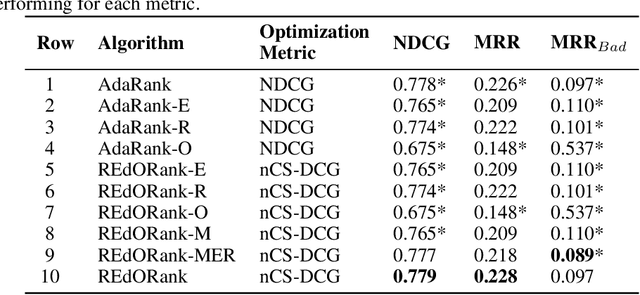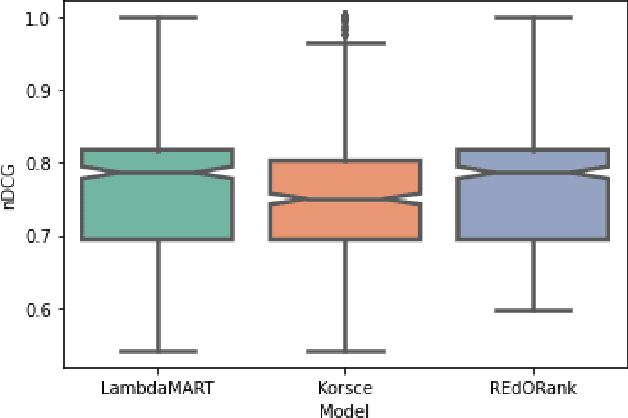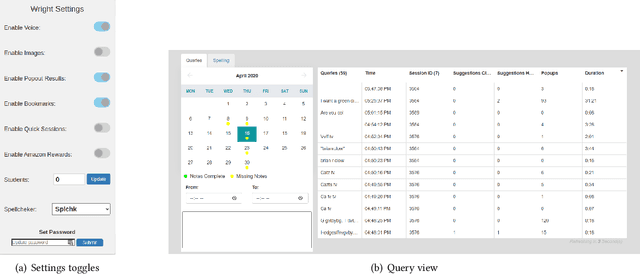Garrett Allen
A Multi-Perspective Learning to Rank Approach to Support Children's Information Seeking in the Classroom
Aug 29, 2023



Abstract:We introduce a novel re-ranking model that aims to augment the functionality of standard search engines to support classroom search activities for children (ages 6 to 11). This model extends the known listwise learning-to-rank framework by balancing risk and reward. Doing so enables the model to prioritize Web resources of high educational alignment, appropriateness, and adequate readability by analyzing the URLs, snippets, and page titles of Web resources retrieved by a given mainstream search engine. Experimental results, including an ablation study and comparisons with existing baselines, showcase the correctness of the proposed model. The outcomes of this work demonstrate the value of considering multiple perspectives inherent to the classroom setting, e.g., educational alignment, readability, and objectionability, when applied to the design of algorithms that can better support children's information discovery.
Power-up! What Can Generative Models Do for Human Computation Workflows?
Jul 05, 2023Abstract:We are amidst an explosion of artificial intelligence research, particularly around large language models (LLMs). These models have a range of applications across domains like medicine, finance, commonsense knowledge graphs, and crowdsourcing. Investigation into LLMs as part of crowdsourcing workflows remains an under-explored space. The crowdsourcing research community has produced a body of work investigating workflows and methods for managing complex tasks using hybrid human-AI methods. Within crowdsourcing, the role of LLMs can be envisioned as akin to a cog in a larger wheel of workflows. From an empirical standpoint, little is currently understood about how LLMs can improve the effectiveness of crowdsourcing workflows and how such workflows can be evaluated. In this work, we present a vision for exploring this gap from the perspectives of various stakeholders involved in the crowdsourcing paradigm -- the task requesters, crowd workers, platforms, and end-users. We identify junctures in typical crowdsourcing workflows at which the introduction of LLMs can play a beneficial role and propose means to augment existing design patterns for crowd work.
Using Conversational Artificial Intelligence to Support Children's Search in the Classroom
Nov 30, 2021Abstract:We present pathways of investigation regarding conversational user interfaces (CUIs) for children in the classroom. We highlight anticipated challenges to be addressed in order to advance knowledge on CUIs for children. Further, we discuss preliminary ideas on strategies for evaluation.
To Infinity and Beyond! Accessibility is the Future for Kids' Search Engines
Jun 15, 2021Abstract:Research in the area of search engines for children remains in its infancy. Seminal works have studied how children use mainstream search engines, as well as how to design and evaluate custom search engines explicitly for children. These works, however, tend to take a one-size-fits-all view, treating children as a unit. Nevertheless, even at the same age, children are known to possess and exhibit different capabilities. These differences affect how children access and use search engines. To better serve children, in this vision paper, we spotlight accessibility and discuss why current research on children and search engines does not, but should, focus on this significant matter.
CASTing a Net: Supporting Teachers with Search Technology
May 07, 2021
Abstract:Past and current research has typically focused on ensuring that search technology for the classroom serves children. In this paper, we argue for the need to broaden the research focus to include teachers and how search technology can aid them. In particular, we share how furnishing a behind-the-scenes portal for teachers can empower them by providing a window into the spelling, writing, and concept connection skills of their students.
 Add to Chrome
Add to Chrome Add to Firefox
Add to Firefox Add to Edge
Add to Edge